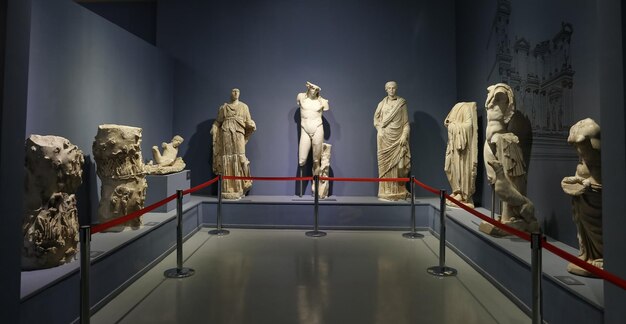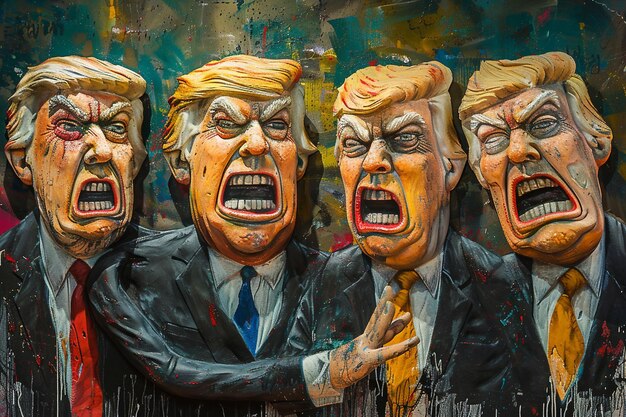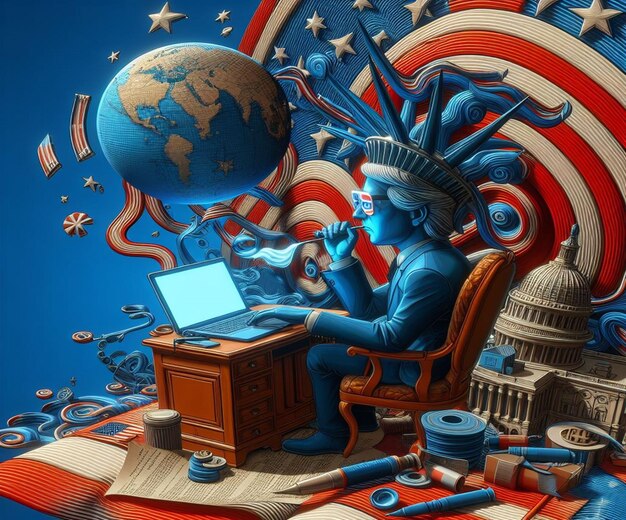The Chaos Agents: Beyond Trump – Understanding the Role of Demagogues in Politics
In the aftermath of the tumultuous Trump presidency, many have pondered over the question: “Who next?” or “What’s next?” The answer, however, may not be as straightforward as it seems. This essay aims to shed light on a pervasive yet often misunderstood phenomenon in politics: the role of demagogues. These individuals, characterized by their ability to rouse public emotions and exploit uncertainties, have been instrumental in shaping political landscapes since antiquity.
Demagogues: A Historical Overview
Historically, demagogues have emerged as leaders in times of social upheaval and political instability. From ancient Rome to modern Europe and beyond, their impact on society and politics has been profound. One can trace the roots of demagoguery back to figures like Coriolanus, a Roman general who, driven by ambition and a sense of entitlement, sought to manipulate the mob for personal gain. Fast forward to the 20th century, and one finds demagogues like Adolf Hitler, who effectively harnessed the fears and frustrations of a nation to launch a devastating war.
Demagogues in the 21st Century
As we move into the 21st century, it becomes increasingly important to understand the mechanics of demagoguery and its potential consequences. The election of Donald Trump in 2016 served as a stark reminder that this age-old phenomenon remains very much alive and well. By tapping into the angst and resentment of a large segment of the population, Trump was able to secure the Republican nomination and eventually the presidency. His rise to power was fueled by a mastery of communication tactics designed to stoke fear, provoke outrage, and ignite division among the electorate.
The Trump Playbook
Trump’s success can be attributed to several key elements of his communication strategy. He was a prolific and provocative tweeter, often employing language that was deliberately divisive or inflammatory. His rallies were marked by an almost obsessive focus on “the enemy,” whether real or imagined. Trump also made use of symbols and slogans that resonated with his supporters, such as the “Make America Great Again” hat and the chant of “lock her up!” against Hillary Clinton.
The Impact of Demagoguery
Demagogues like Trump can have far-reaching consequences on the political and social fabric of a nation. Their divisive rhetoric can fuel intolerance, hate speech, and even violence against those who hold opposing views. Moreover, demagogues often exploit economic insecurity, political instability, and cultural anxiety to advance their own interests. In extreme cases, they may even foment civil unrest or even war.
A Call to Action
As we navigate the post-Trump political landscape, it is essential that we remain vigilant against the seductive allure of demagogues. This demands a commitment to critical thinking, factual accuracy, and open dialogue across political divides. By recognizing the tactics of demagoguery for what they are – manipulative attempts to sow discord and exploit fear – we can better protect our democracy and promote a more constructive, inclusive political discourse.

Introduction
Demagogy, a term with ancient origins, refers to the art of appealing to popular emotions and prejudices for political gain. This tactic has been employed throughout history, manipulating masses to support agendas that may not be in their best interests.
Origins in Ancient Greece
The concept of demagogy can be traced back to ancient Athens, where it was employed by politicians seeking public office. Demagogues used persuasive speeches and emotional appeals to sway the opinions of the masses, often inciting them against perceived enemies or scapegoats.
Use Throughout History
Throughout history, demagogues have continued to play significant roles in shaping the political landscape. From Julius Caesar and Joseph McCarthy to Adolf Hitler and Donald Trump, these individuals have harnessed the power of demagogy to manipulate public opinion and consolidate power.
Connection Between Demagogy and Modern Politics
In modern politics, demagogues continue to employ this tactic to fuel divisive rhetoric and stir up public unrest. They exploit fear, anger, and other negative emotions to rally support for their agendas.
The Importance of Understanding the Role of Demagogues in Contemporary Society
Understanding the role of demagogues in contemporary society is crucial for several reasons. First, it allows us to recognize and resist manipulative tactics used by political leaders. Second, it sheds light on the complex dynamics of public opinion and political power. Lastly, it serves as a reminder of the dangers of allowing emotional appeals to overshadow reasoned discourse in public life.

Understanding Demagogues: Characteristics and Tactics
Emotional appeal over reason:
- Use of fear, anger, and anxiety to manipulate crowds: Demagogues often rely on raw emotions to mobilize their followers. They stoke fear, anger, and anxiety in the crowd, exploiting their anxieties and prejudices to manipulate them into taking action.
- Simplification of complex issues into black-and-white narratives: Complex issues are simplified into binary choices, with clear distinctions between “us” and “them”. This creates a sense of moral righteousness among the followers, making it easier for them to support extreme measures against their perceived enemies.
Use of rhetoric to create a sense of Us vs. Them mentality:
- Scapegoating and dehumanization of opponents: Demagogues often use scapegoats to deflect blame for their actions or to stir up anger against a particular group. They dehumanize their opponents, treating them as less than human, making it easier to justify harsh measures against them.
- Building a cult of personality: Demagogues often build a strong personal brand, using their charisma and rhetoric to create a sense of adoration and loyalty among their followers. This can make it difficult for critics to challenge them effectively.
Use of social media to amplify messages and bypass traditional media gatekeepers:
- The role of echo chambers and filter bubbles in shaping public opinion: Social media platforms can create echo chambers, where users are only exposed to like-minded opinions, reinforcing their beliefs and making it difficult for alternative viewpoints to be heard.
- The impact of algorithms on spreading misinformation: Social media algorithms can help spread false information quickly and widely, making it important to be vigilant about fact-checking and verifying sources.
Use of lies, half-truths, and distortions to manipulate facts:
- The importance of fact-checking in combating demagoguery: Demagogues often use lies, half-truths, and distortions to manipulate facts. It is important for citizens to fact-check information before sharing it with others and to be aware of the sources of their news.
- The psychological effects of propaganda on audience perception: Propaganda can have powerful psychological effects, shaping people’s perceptions and beliefs in subtle but significant ways. It is important to be aware of these effects and to resist the temptation to believe everything we hear without question.

I Trump as a Demagogue: Techniques and Consequences
Campaign Tactics and Rhetoric
During his presidential campaign, Donald Trump employed tactics and rhetoric that many criticized as demagoguery. One of his most notable techniques was the use of fearmongering and divisive language. He frequently targeted specific groups, such as immigrants and minorities, stoking fear and anxiety among his supporters. Another tactic was the frequent use of social media to bypass traditional media outlets, allowing him to communicate directly with his base and shape public discourse in real time.
Policy Implications and Consequences
Trump’s demagogic campaign tactics translated into policy proposals with significant consequences for various communities. For instance, his immigration policies, such as the travel ban and family separation at the border, sparked widespread controversy and outrage. Moreover, his trade policies, including tariffs on imports from China and other countries, had a profound effect on the economy, with some experts predicting negative consequences for American consumers and businesses.
Impact on Public Discourse and Political Norms
Trump’s demagogic rhetoric also had far-reaching implications for public discourse and political norms. For example, his habitual lying and disregard for the truth normalized falsehoods in politics, making it increasingly difficult for Americans to discern fact from fiction. Additionally, his divisive rhetoric eroded bipartisanship and cooperation, making it harder for politicians to find common ground and work together.
The Role of Enablers and the Media in Enabling Demagoguery
Trump’s demagogic tactics could not have been effective without the complicity of his political allies and the media. Many Republicans in Congress refused to criticize or condemn Trump’s words and actions, even when they were clearly divisive and harmful. Similarly, some media outlets gave Trump disproportionate coverage and failed to fact-check his claims or hold him accountable for his falsehoods.

Beyond Trump: Recognizing and Combating Demagoguery in Politics
Building Resistance to Demagogic Tactics
- Fact-checking and media literacy education: In an era where misinformation spreads rapidly, it’s crucial to promote fact-checking and media literacy. By equipping individuals with the skills to discern truth from falsehood, we can build a stronger foundation for informed political discourse.
- Encouraging civility, respect, and dialogue in political discourse: Amidst heated debates, it’s essential to maintain respect and open communication. By fostering a civil discourse, we can bridge divides and create an environment where productive dialogue takes place.
Holding Political Leaders Accountable for Their Actions and Rhetoric
- Implementing fact-checking mechanisms within government: Governments can establish fact-checking bodies to ensure accuracy and transparency in public statements. This not only promotes accountability but also builds trust with the electorate.
- Encouraging bipartisanship and compromise: Political leaders must work together to find common ground and reach consensus. By fostering a culture of collaboration, we can move beyond divisive rhetoric and focus on the issues that matter most.
The Role of Civil Society in Combating Demagoguery
- Building strong institutions that protect democratic norms: Civil society plays a vital role in upholding democratic values. Strong institutions, such as courts and watchdog organizations, help ensure that leaders adhere to the rule of law.
- Engaging in grassroots activism and community organizing: Grassroots movements and community organizing can be powerful tools in advocating for change. By coming together to raise awareness and take action, citizens can hold their leaders accountable and drive positive change.
The Importance of a Vibrant, Free Press in Holding Power to Account
- Encouraging media literacy and fact-checking skills among journalists: Journalists must be equipped with the tools to verify information and report accurately. By fostering a culture of media literacy, we can ensure that journalists uphold their role as guardians of truth.
- Supporting independent, fact-driven journalism: A free and independent press is essential in holding power to account. By supporting fact-driven journalism, we can ensure that accurate information reaches the public and influences political discourse.

Conclusion
As we have explored throughout this discourse, the emergence and influence of demagogues in contemporary politics is a pressing issue that demands our attention. Demagoguery, with its manipulative tactics and appeal to the emotions and fears of the masses, has been a persistent force throughout history, fueling political instability and undermining democratic institutions. In today’s polarized political landscape, where misinformation spreads at an alarming rate and ideological divides deepen, the potential for demagogues to exploit these conditions and sow discord is greater than ever before.
Recap of the Importance of Understanding Demagogues
It is essential to recognize that understanding demagogues and their methods is not just an academic pursuit; it is a matter of civic duty and personal responsibility. By recognizing the signs of demagoguery, we can protect ourselves and our communities from the destructive effects of divisive rhetoric and manipulative political tactics. We must be vigilant in identifying demagogues, challenging their lies, and promoting factual information and open dialogue.
Call to Action for Individuals, Organizations, and Governments
Individuals: Each of us can play a role in combating demagoguery. By engaging in informed and respectful conversations, fact-checking information, and supporting reputable news sources, we can help build a more resilient and informed society. It is also essential to hold elected officials accountable for their words and actions, and to demand that they uphold the principles of truth, transparency, and respect for all people.
Organizations:
Non-governmental organizations and media outlets have a crucial role to play in this struggle. They must commit to factual reporting, transparency, and promoting open dialogue. Organizations that peddle misinformation or engage in demagogic tactics should be called out and held accountable.
Governments:
Governments must also take action to combat demagoguery. They can do this by strengthening democratic institutions, enforcing media regulations, and promoting education and critical thinking skills. Moreover, governments must resist the temptation to employ demagogic tactics themselves, even if it seems politically expedient in the short term.
Reflection on the Future of Democracy
The future of democracy is uncertain in an era of increasing political polarization and misinformation. The rise of demagogues and their ability to manipulate public opinion poses a significant threat to the foundations of our democratic societies. However, by staying informed, engaging in thoughtful dialogue, and working together to combat demagoguery, we can help ensure that the principles of truth, transparency, and respect for all people continue to guide us forward.
